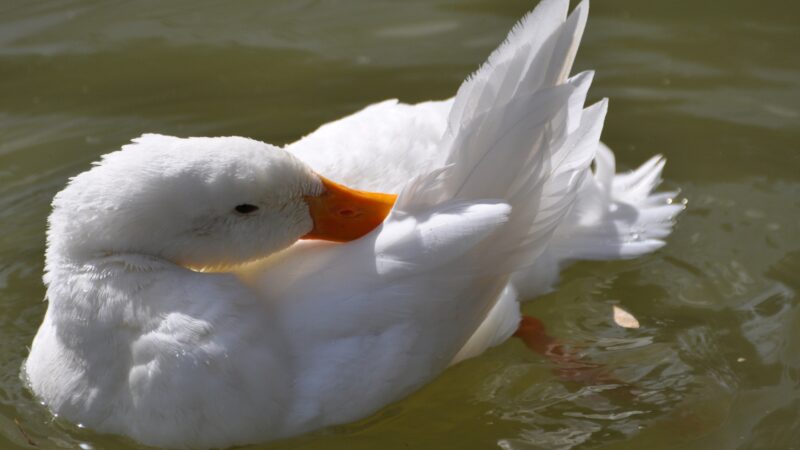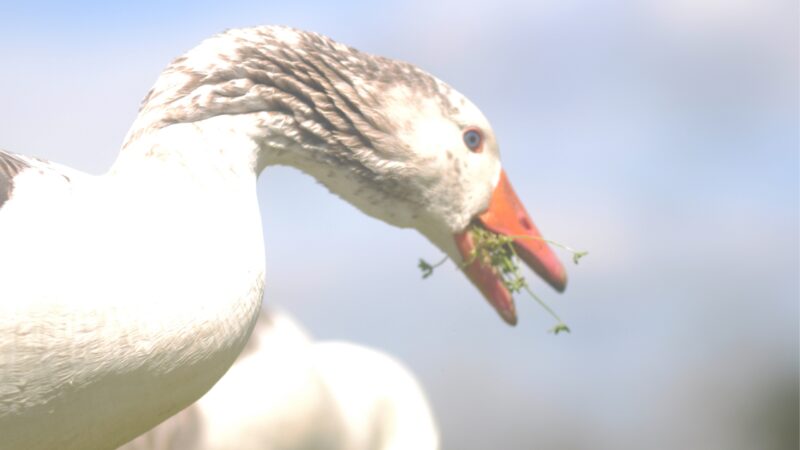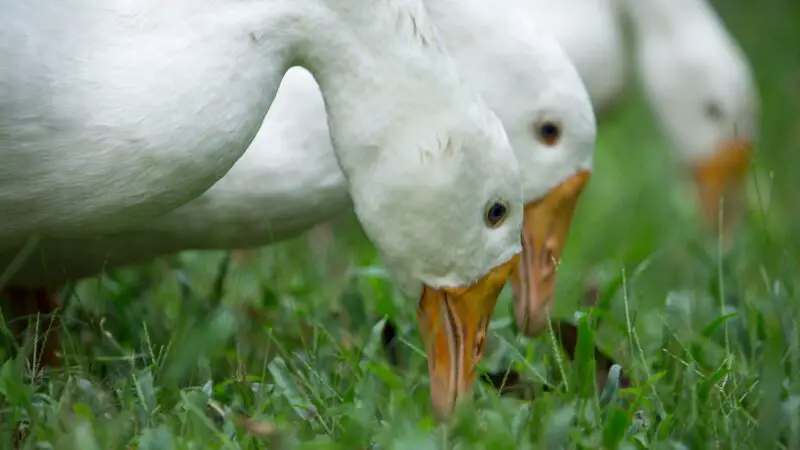Ducks have been domesticated for centuries and are usually bred for meat and egg production. But while ducks generally coexist with humans, their behavior is still a mystery to many people.
Despite being herbivorous waterfowl and not predators, some can be aggressive under certain circumstances. But how aggressive can they be?
Ducks do bite and may cause severe pain and injuries. In some cases, duck bites can lead to wounds and skin infections. Ducks may bite each other, their owners, and other animals. Some duck species are more aggressive than others, but it still depends on the situation. Sometimes, they bite without warning.
If you plan to raise ducks, this article will teach you about their behavior. Here, you will learn what to do if a duck bites you and some helpful preventive measures.
Do Ducks Have Teeth?

Ducks don’t have teeth the same way humans and mammals do. Instead, they have thin bristles arranged in rows in their mouths called lamellae.
These thin, comb-like structures are not visible outside and can only be seen once the duck opens its bill (mouth). The number, size, and spacing of “duck teeth” vary, depending on the species.
Are Ducks Aggressive All the Time?

Ducks are not aggressive all the time. They are generally playful, sociable, and peaceful creatures.
However, there are times that they can be aggressive towards each other and humans as well. Drakes (male ducks) are more likely to be aggressive than female ducks. Backyard ducks are also not as aggressive as mallards (wild ducks).
Why Do Ducks Bite?

Ducks bite due to several reasons. They usually bite humans to protect their mates and offspring. Ducks may also bite each other to fight over food. In most cases, drakes are the aggressive ones when they feel threatened.
They also bite each other to fight for dominance. Most adult female ducks don’t bite and may run or fly away to escape.
Note that drakes may bite you even if you raised them since they were young. But since ducks are not natural predators, they are still very rare to attack humans.
Contrary to what some people think, ducks bite humans to show aggression, not affection. However, hungry ducks may accidentally bite you while feeding them by hand.
Another potential reason why ducks bite is they have imprinted on you. Imprinting happens when ducklings see you (or any animal) after opening their eyes for the first time. As time passes and bonding has formed, ducklings “thought” that you are their mother. Therefore, they will not stop following you and will eventually bite you.
Do Duck Bites Hurt?
Duck bites do hurt. Nevertheless, the injury varies depending on the strength of the bite. Despite having no teeth, ducks can bite hard enough to cause severe pain.
If the bite is light, it may feel like a small pinch on the skin. But if the duck bites hard, it can leave bruising or swelling and may lead to bleeding. A serious duck bite is very painful.
Are Duck Bites Dangerous?

Duck bites are not dangerous. Depending on the bite and duck species, they may cause discomfort, skin irritation, and small wounds.
But unlike some mammals, ducks don’t have rabies that can be transmitted to humans through their bites. Unlike some snake and spider spiders, they also don’t have venom that can paralyze their victims.
Can You Get Infections From a Duck?
You can get some infections from a duck if the fowl is sick. But again, ducks cannot transmit diseases to humans by simply biting them. However, some ducks may have zoonotic diseases or illnesses that can be transmitted to humans through contact with contaminated food and water, duck poop and feathers, and inhalation of dust particles.
Common duck diseases that can infect humans include Avian Influenza (bird flu), Campylobacteriosis, Newcastle Disease, Salmonellosis, and Psittacosis. Note that some infected ducks may not show symptoms of these diseases. Meanwhile, duck bites can also cause deep punctures and skin infections. They are not life-threatening, though.
What to Do if a Duck Bites You?
Pulling your skin away while the duck is biting can be very painful due to their sharp “teeth.” Instead, you can tap the duck’s head until the animal lets go of you.
Alternatively, you can scream at them and tell the duck you are superior to them. Once the duck leaves, here are some useful tips on how to treat a duck bite:
- Check your skin to know if the bite is serious or not.
- Take over-the-counter pain relievers if the duck bite is painful but does not cause a wound.
- If the bite has caused a wound or swelling, clean it with mild soap and water. If possible, place the wound under running water.
- If there is bleeding, put some pressure on it using a clean cloth until it stops.
- Avoid using rubbing alcohol or hydrogen peroxide when cleaning an open wound. Both can be too harsh on your skin, especially on children.
- Instead, apply antibiotic ointment or petroleum jelly. Either can kill potential bacteria on your wound and help it heal faster.
- Cover the wound with a sterilized bandage to protect it from dirt and bacteria. If the wound is quite small, covering it may not be necessary.
- Change the dressing at least once a day or whenever it becomes dirty or wet.
- If the wound is big and severe, consult a doctor at once.
How to Make a Duck Stop Biting You?
As mentioned, ducks, especially drakes, don’t attack without reason. Dealing with aggressive ducks can lead to biting and are challenging to control. Some breeds, such as the Muscovy duck, are more aggressive than others. In worst-case scenarios, the only option is to cull them.
But then, here are other ways to stop ducks from biting you:
- During feeding time, wear long sleeves, jeans, and boots and go near them slowly.
- If a duck tries to bite you, don’t run away. Otherwise, the duct will chase you until it reaches you.
- Stand your ground and pick them up gently. Place them under your arm to help them calm down.
- Don’t give treats or bribes to stop them from biting. This is just like tolerating their bad behavior.
- Offer the duck something else to bite. Instead of food, give knotted ropes or chew toys. Just make sure the duck cannot swallow them.
- If you only have one duck, add two or more. This will help the fowl learn to stay calm and socialize with other ducks.
How to Tell if a Duck Likes You?
Domesticated ducks are generally affectionate to humans. If you have been handling your ducks properly and caring for them, they may show signs of affection. These waterfowls are very sociable creatures and love to bond with their owners.
To give you an idea, here are some mannerisms that ducks do to show how much they like you:
- Ducks will quack softly or make quiet chirping sounds once they see you.
- Just like ducklings, adult ducks will move their heads up and down.
- Ducks may also wag their tails as if requesting you to pet them.
- Ducks will slowly come to you but not bite or hiss at you.
- Ducks will follow you wherever you go, even if you don’t have food for them.
- Ducks will allow you to carry them under your arms.
- Ducks may fall asleep while you are cuddling them.
How to Tame a Duck?
Ducks are not naturally aggressive. When they do, it’s more of their defensive mechanism. Surprisingly, ducks are also intelligent and trainable. With some patience, you can make your ducks like you whether you hand-raise them.
To help you out, below are some useful tips on how to tame a duck before they become aggressive:
- Don’t allow ducks to imprint on you if you cannot control them, especially the drakes. Otherwise, they may attack another person or duck that comes near you.
- Avoid mixing too many drakes with a few females in one coop to avoid fighting. Having one drake for every four hens is recommended.
- Separate the drakes from female ducks once they become too aggressive toward them.
- Avoid hand-feeding drakes, especially if you have many of them. This can lead to jealousy and fighting among them.
- Feed the ducks with nutritious food on time. Ducks can turn aggressive once they are very hungry and unhealthy.
- Allow them to see you regularly and show dominance over them.
Related Questions
Can Ducks Bite Your Finger Off?
Ducks cannot bite your finger off. Even the most aggressive duck breed cannot do that. This is because their jaws are not strong enough, and their lamellae are too sharp to cut a finger or any body parts.
But again, some duck bites can break the skin and be extremely painful. Sometimes, they can also cause bleeding.
Why Do Ducklings Like to Nibble at You?
Ducklings will tend to nibble at you if they like you. These small bites are not painful and are signs of showing their affection.
This usually happens when you are giving them food, especially when you feed them at your hand. Happy ducklings may also move their heads up and down. Drakes and female ducks rarely nibble at humans, though.
Can Ducks Attack Other Animals?
Ducks can also attack other animals, even those that are bigger than them. This behavior is usually seen in drakes, as most are territorial and will protect their mate or ducklings from harm.
Although ducks and dogs can live together peacefully, some drakes may bully small, friendly dog breeds. Ducks may also attack kittens.
Why Do Ducks Hiss at You?
Ducks hissing at you means they will likely attack you soon. They will hiss at you once they feel threatened by your presence.
This usually happens if you move towards them or pick them up or their ducklings. At this point, you should move away very slowly and avoid eye-to-eye contact with them.
Can Female Ducks Be Aggressive as Well?
Female ducks can also be aggressive, but only on very rare occasions. Unlike drakes, mother ducks (hens) are unlikely to attack you if you don’t harm them or their ducklings.
Some female ducks may be aggressive towards other ducks to fight for food. Nonetheless, ducks are not as violent as chickens while establishing the pecking order.
Can You Tame a Wild Duck?
You can tame a wild duck. Although the procedures are a bit similar to that for domesticated ducks, there are some strict precautions. Never feed wild ducks in parks, creeks, and other public places. While this habit can be a great way to tame them, it can lead to problems for the ducks’ health and the environment.
Ducks in the wild have natural resources of food around them. Hence, feeding them with bread may lead to malnutrition. It will also attract other ducks and may cause overcrowding.
Not to mention, leftover bread can attract other pests, such as rats. So, if you want to tame wild ducks, have them in your backyard and treat them as your pets.
